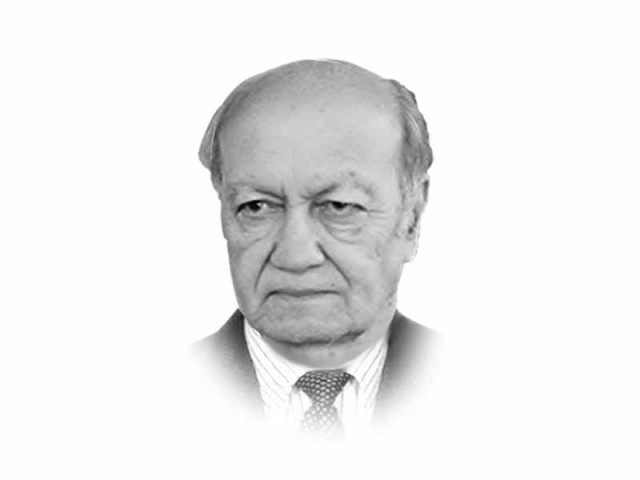America’s Syria and Afghan policy
Trump saw no meaningful purpose behind retaining US forces

What is the rationale behind these and their likely impact? It is well known that President Trump, as a matter of broad policy, has always been opposed to US military involvement in these conflict-ridden regions, be it the Middle East or Afghanistan. This policy framework was a part of his election manifesto. It was on advice and under pressure from the Pentagon that President Trump conceded to retain troops in these countries.
In Syria after Kurds and other forces opposing Assad’s regime were on the retreat, Trump saw no meaningful purpose behind retaining US forces. Withdrawal from Syria and the subsequent resignation of General Mattis would be unsettling for Nato allies where he is held in high esteem. From their perspective, the withdrawal of US forces is considered as empowering inimical forces and damaging Nato. In fact, General Mattis was unequivocal that President Trump’s policy posed a danger to world order. There are fears that it would not be a surprise if Trump decides to pull out of Nato or take policy decisions further weakening it, thereby compelling its members especially Germany and France to raise their own forces and reduce reliance on the United States.
It is believed one of the motivations of President Trump for pulling back troops is to deploy them to guard the Mexican border. In addition, the prolonged stalemate in Afghanistan and the failure to influence events in Syria have frustrated Trump. The United States government will also be withdrawing advisers from Syria that were engaged in supporting reconstruction efforts and essential services. President Trump has been claiming that US forces having routed the Islamic State (IS), their presence and that of the support system in Syria becomes pointless. Although reality is that the IS has been weakened but not routed.
The president, however, believes the withdrawal of forces would result in reducing the defence budget that could be used effectively for improving the lives of the Americans. This is a major departure from the previous American policy to remain a dominant player in Syria that is a critical part of the Middle East and centre of big power and regional rivalry. Apart from being more pragmatic, Trump like former president Obama realised that no tangible benefit would accrue by retaining troops in Syria, and is prepared to concede influence in the region to Russia, Turkey and Iran.
Reaction from allies and hawks was as expected. In view of Benjamin Netanyahu’s close relationship with President Trump and the way he has leaned towards Israel, the prime minister has been diplomatic in his comments. Although he considers that the US withdrawal would lead to further chaos in the region and facilitate the IS to make a comeback. French President Emmanuel Macron has been far more vocal in his criticism.
It is likely Syria and Turkey would be aiming at gaining control of areas vacated by the Kurds.
Currently Russia and Iran are cooperating in stabilising Syria but their interests in future may not necessarily converge.
Pakistan is not directly affected by events in Syria or the Middle East but its adverse implications are always present. A few group of Pakistanis, at one time, were misled by the IS to join their forces fighting in Syria. That phase hopefully is over. At the diplomatic level, Pakistan has to maintain a delicate balance in its policy towards Syria and stay away from Arab-Iran or Arab-Turkish rivalry.
However, the evolving Washington policy on Afghanistan has direct consequences for Pakistan.
The United States has sent an unequivocal message that it is serious about lowering its presence in Afghanistan. Announcing the reduction of American forces in Afghanistan while talks with the Taliban are at a crucial stage would encourage them to take a tougher stand during negotiations.
Expectations of the United States that the Pakistan military would facilitate the talks by exerting maximum pressure on the Taliban leadership are high. The rather conciliatory approach towards Pakistan is part of this wider strategy. Pakistan used its clout with the Taliban leadership to engage with Khalilzad, the US Special Representative for Afghanistan. The release of Mullah Baradar, one of the founding Taliban members, was a part of the same policy. How far Pakistan would be able to influence in bringing a settlement is yet to be seen.
Pakistan does not favour a hasty withdrawal of the United States as that would lead to chaos and intensify Afghanistan’s civil war. This would have repercussions for Pakistan. But there are strong indications that President Trump’s patience with Afghanistan has been running out and he may work out some agreement with the Taliban in the early part of next year.
Although one would wish the best for Afghanistan but in case of the United States leaving without a satisfactory solution it could invite anarchy and chaos. Fencing of the border on our side is to be completed by end of next year and that would partially help in managing the border. More important would be to step up peace efforts in close cooperation with China to bring pressure on the Taliban to agree to a political settlement. Iran too has a major role to play. Russia’s increasing interest in Afghanistan’s future stability is understandable. It is in the vital interest of Pakistan that Afghanistan moves towards peace and retains its democratic structure. The Taliban may have proved to be resilient fighters but their capture of power would have serious consequences for the region. The coming months require Pakistan to play its role in the most sagacious manner in Afghanistan’s reconciliation efforts steering above short-term narrow interests.
Published in The Express Tribune, December 26th, 2018.
Like Opinion & Editorial on Facebook, follow @ETOpEd on Twitter to receive all updates on all our daily pieces.












1724319076-0/Untitled-design-(5)1724319076-0-208x130.webp)


COMMENTS
Comments are moderated and generally will be posted if they are on-topic and not abusive.
For more information, please see our Comments FAQ